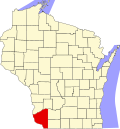Beetown, Wisconsin | |
|---|---|
 Looking north at Beetown from WIS 81 | |
| Coordinates: 42°47′42″N90°53′07″W / 42.79500°N 90.88528°W | |
| Country | |
| State | |
| County | Grant |
| Town | Beetown |
| Elevation | 250 m (810 ft) |
| Time zone | UTC-6 (Central (CST)) |
| • Summer (DST) | UTC-5 (CDT) |
| Area code | 608 |
| GNIS feature ID | 1561503 [1] |
Beetown is an unincorporated community in the town of Beetown, Grant County, Wisconsin, United States. [1] Wisconsin Highway 81 passes through the community.


